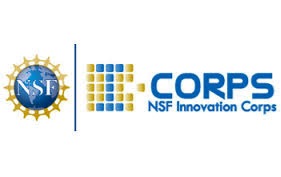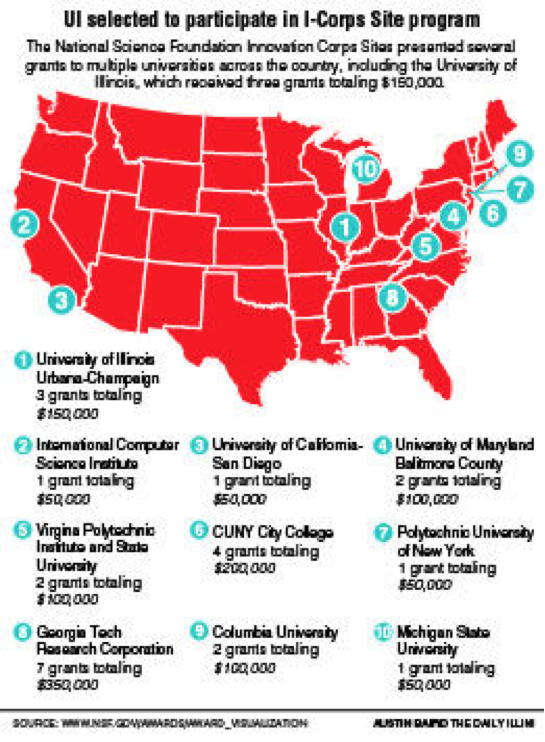Organization:National Science Foundation I-Corps
Insert non-formatted text here
Contents
Overview
Launched in October 2011, the National Science Foundation Innovation Corps (NSF I-Corps) program prepares scientists and engineers to extend NSF funded laboratory research projects into the commercial world. Knowledge from NSF-supported basic research can have marketable impact, and thus NSF I-Corps promotes the translation of technologies that will have direct benefits for the economy and society. Importantly, I-Corps is a public-private partnership program, which teaches grantees to recognize valuable product opportunities that can arise from academic research. A targeted curriculum that provides guidance from established entrepreneurs allows viable entrepreneurship training to student participants.
NSF I-Corps aims to strengthen the innovation ecosystem at the local and national levels by incorporating programs such as the I-Corps Teams, Nodes and Sites. An NSF supported researcher or institution can apply to either of these programs to help fund their innovative research ideas to the market place. Significantly, NSF I-Corps prepares the participants to successfully apply for the NSF Small Business Innovation Research (SBIR) and Small Business Technology Transfer (STTR) programs.
Purpose
The primary goal of NSF I-Corps is to promote entrepreneurship from NSF-funded research leading to the commercialization of novel technology. Entrepreneurship is approached through the emphasis of customer and business development. I-Corps will be the vehicle to foster start-ups founded by the participants, making successful I-Corps projects prepared for business formation. Prominently, I-Corps programs bridge the NSF Small Business Innovation Research (SBIR) and Small Business Technology Transfer (STTR) programs. When applicable, additional resources from the private sector are sought by NSF in the form of partnerships and finance.
To achieve its purpose, NSF I-Corps has three distinct components: Teams, Nodes and Sites. I-Corps Teams are comprised of the principal investigator(s) (PI), an entrepreneurial lead (EL) (i.e. student or postdoc) and business mentor. I-Corps Nodes are hubs (i.e. academic institution) for education, infrastructure and research that aid academic scientists and engineers in innovation. Moreover, I-Corps Nodes deliver the I-Corps Curriculum to I-Corps Teams. Finally, I-Corps Sites are academic institutions that strengthen local innovation by aiding multiple local teams for their technology transition. Depending on position stance as described, NSF I-Corps funding will be allocated to successful applicants of Teams, Nodes or Sites to initiate the purpose of developing an innovation ecosystem.
Distinct Differences From Other Offerings
The NSF I-Corps program is unique in the following ways:
- Entrepreneurial goal is aimed to commercialize an NSF funded research technology
- NSF I-Corps Team maximum funding is $50,000 for 6 months (research lab on campus can apply for this)
- NSF I-Corps Nodes and Sites funding is up to $1.5 million (academic institutions can apply as a Node or Site)
- Feeds into successfully applying for an SBIR/STTR
- Fosters entrepreneurship with additional resources to participants (i.e. workshops, business mentors, etc.). NSF I-Corps Team participants are provided the Lean LaunchPad class taught by Steve Blank.
- Promotes an innovation ecosystem for both students and academic institutions
- I-Corp Teams follow a curriculum made up of seven hypothesis-validation components: 1) Value Proposition of the proposed product. 2) Customer use-case and pain point (identifying customer problems). 3) Demand creation. 4) Channel development. 5) Revenue model. 6)Partnership strategy. 7)Resource requirement (what are most important assets required).
- Monthly webinars that disburse needed developmental skills.
Impact Achieved For Students and Campus
NSF I-Corps has helped many students and campuses develop entrepreneurial pursuits with laboratory research technologies. Below are three presentations and one video from successful I-Corps Teamsat Rochester Institute of Technology, Carnegie-Mellon University, University of Pennsylvania and Uinvesity of Nebraska - Lincoln (video).
Rochester Institute of Technology
Akara Solutions: Flexible, Low Cost Cooling Technology for LED Lighting, Principal Investigator: Satish Kandlikar, Rochester Institute of Technology
Carnegie-Mellon University
Semiconductor-Based Hydrogen and Hydrocarbon Sensors, Principal Investigator: Lisa Porter, Carnegie-Mellon University
University of Pennsylvania
Pilot Production Of Large Area Uniform Single-Crystal Graphene Films, Principal Investigator: Alan Johnson, University of Pennsylvania
University of Nebraska-Lincoln
Imagaing Diseases, Principal Investigator: Stephen DiMagno, University of Nebraska-Lincoln
Other Universities
Five I-Corps Nodes have been selected at Atlanta (Georgia Tech), Ann Arbor (University of Michigan), Washington, DC Area (University of Maryland, George Washington University, Virginia Tech), New York Area (CUNY, NYU, Columbia), and San Francisco Bay Area (UCSF, UC Berkeley, Stanford). This website explains the NSF I-Corps Node at Georgia Tech.
Currently, there are 10 NSF I-Corps Sitesinthe United States:
Steps Required To Bring Resource to Campus
The NSF I-Corps program can be brought to your campus in three ways: Teams, Nodes or Sites. Individual research labs that have had NSF funding in the last five years can apply for the NSF I-Corps Team. Academic institutions can apply to be either a Node or Site to foster selected teams on campus.
I-Corps Team
- Need to identify a principal investigator (PI), entrepreneurial lead (student), and business mentor
- Either the PI or entrepreneurial lead needs to have NSF funding or has had NSF funding within the last five years to apply for an NSF I-Corps Team
- Identify the research technology that can be commercialized
- All members on the team must fully participate in the I-Corps Curriculum.
- Contact a program officer on the NSF I-Corps website to assess if the Team is eligible for an NSF I-Corps Team grant.
- Apply on the NSF I-Corps website.
Prinicipal Investigator (PI): Serves as the technical lead and the project manager.
Entrepreneurial Lead (EI): Typically a postdoctoral researcher, graduate student, or other student that possesses relevant technical knowledge and deep commitment to investigate the commercial landscape surrounding the innovation. This person should be prepared to support the transition of technology if the team demonstrates readiness appropriate to leave the academic institution.
Mentor: This person brings the entrepreneurial experience and serves as the principle guide in determining the technology disposition.
I-Corps Node or Site:
- The academic institution should apply if it has resources setup to be a feasible Node or Site.
- If the academic institution collaborates with multiple departments at the university, then it should apply as a Site. If it is one department, then it should apply as a Node.
- Complete the application on the NSF I-Corps website. Make sure to state how the funds will be distributed on campus to selected research teams to promote entrepreneurship and innovation.
Contact Information http://uoresearch.uoregon.edu/sites/uoresearch1.wc-sites.uoregon.edu/files/resize/uploads/images/IWantYou-2-260x352.jpg
Topic-Specific Program Officers for I-Corps are:
ENG-Rathindra DasGupta
Phone: (703) 292 - 8353
Email: rdasgupt@nsf.gov
CISE-Anita La Salle
Phone: (703) 292 - 5006
Email: alasalle@nsf.gov
BIO- Steve Ellis
Phone: (703) 292- 7876
Email: stellis@nsf.gov
EHR- Don Millard Phone:(703) 292 -4620
Email: dmillard@nsf.gov
GEO- Raffaella Montelli Phone: (703) 292- 4361
Email: rmontell@nsf.gov
MPS- Linda Sapochak Phone: (703) 292- 4932
Email: Isapocha@nsf.gov
SBE- Erik Herron
Phone: (703) 292- 7318
Email: eherron@nsf.gov
Additional I-Corps inquiries may be sent to i-corps@nsf.gov.
For more information, visit the NSF I-Corps website directly at http://www.nsf.gov/news/special_reports/i-corps/index.jsp.
Introductory webinars are held every first Tuesday of the month at 2p.m. est, to answer any questions about I-Corps. The webinars provide updates about the curriculum, I-Corp contacts, and other important dates.
To access the audio webinar by phone call 888-889-0497 U.S. or 210-839-8288 for outside U.S.
To access the webinar with visuals online: Meeting number 740-195-594
Go to http://www.nsf.gov/cgi-bin/goodbye?https://nsf.webex.com/nsf/j.php?ED=221795892&UID=1514200052&PW=NZjJiNjExNzEz&RT=MiMxMQ%3D%3D

